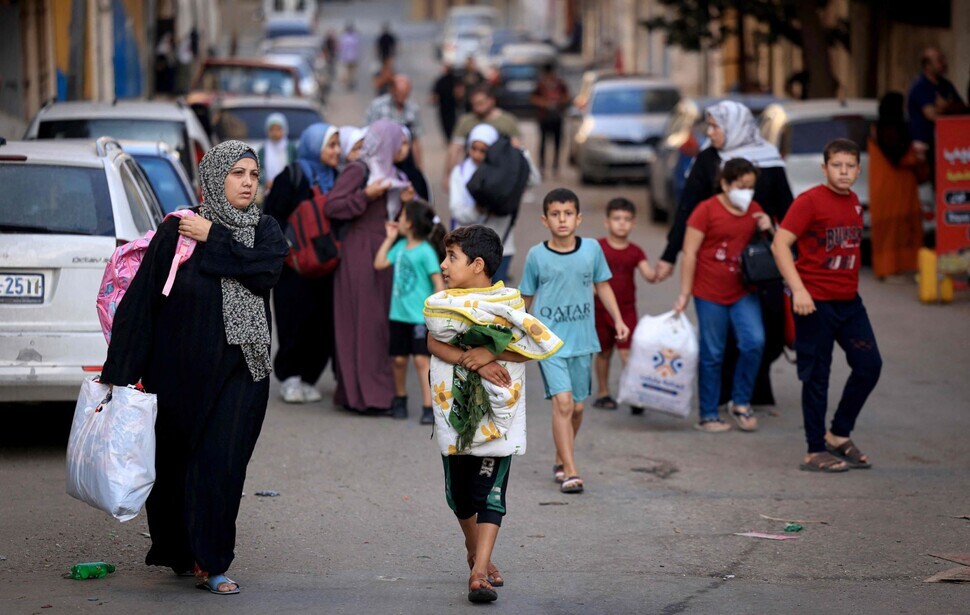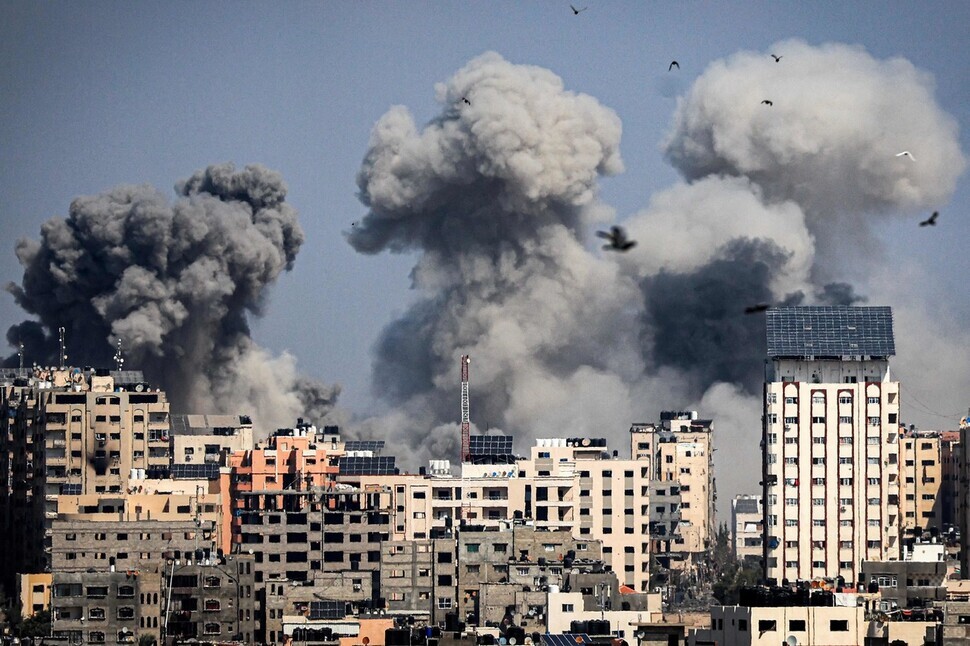hankyoreh
Links to other country sites 다른 나라 사이트 링크
World is seeing outcome of illusion of peace in Middle East that neglected Palestine

Has the Middle East returned to the past? Or has some hidden reality simply come to light after previous efforts to conceal it? Does the perspective that views the Palestine conflict as the central element in conflict in the Middle East — where no peace is possible in the region without some kind of solution — belong to the past or to the realm of concealed reality?
These are the questions posed to us by the war between Israel and Hamas following the Palestinian organization’s full-scale attack on Oct. 7. On Sept. 15, 2020, Israel established diplomatic relations with the United Arab Emirates and Bahrain through US mediation. The latest situation shows just how fragile that new Middle Eastern order is.
The Abraham Accords — which took their name from the common forefather of the Jews and Arabs — represented an ambitious project to create a new order in the Middle East by fully normalizing relations between Israel and the Arab states.
They led in turn to Israel forming diplomatic relations with Morocco in December 2020 and with Sudan in January 2021.
Brakes slammed on Israel-Saudi diplomatic tiesThe ultimate achievement of the Abraham Accords would be diplomatic relations between Israel and Saudi Arabia, the very heart of the Islamic world. Recently, rapid strides have been made in that area.
Speaking with Fox News on Sept. 20, Crown Prince Mohammed bin Salman, a major authority in Saudi Arabia, said, “Every day we get closer [with Israel]. It seems it’s for the first time real one serious.”
He also said this would be “the biggest historical deal since the end of the Cold War.”
From the outset, diplomatic relations between Israel and Saudi Arabia were the target of the Abraham Accords pursued by the US government under former president Donald Trump. Were they to establish ties, it would be a watershed event that alters the very geopolitical landscape of the Middle East.
The Abraham Accords also emerged against a backdrop of conflict in the Middle East that started with the 1979 Islamic revolution in Iran and underwent a complete transformation with the US’ war in Iraq from 2003 to 2011. Since then, the shape of conflict has shifted to one pitting Sunni Arabs — mainly in Saudi Arabia — and an Iranian-led Shia alliance.
The Palestinian conflict, which first erupted with the establishment of the modern state of Israel on Palestinian territory in 1948, has been a major part of the postwar Middle East conflict. Between then and 1973, Israel fought four wars against Arab states, including Egypt.
After that, Israel and Egypt were forced to acknowledge each other, and in 1979 they formed diplomatic relations. It was the very same year that the Iranian Revolution occurred.
Transforming into a Shia Islamic republic, Iran pulled out of its alliance with the US and threatened conservative Sunni monarchies in Saudi Arabia and elsewhere. Instead of Arab nationalism, Islamism began drawing widespread support among people in Arab countries.
The Iraq War waged by the US led to the downfall of the Saddam Hussein regime in Iraq, which had been keeping Iran in check. Saudi Arabia and other conservative Sunni monarchies now had to deal with Iran directly.
The result was a shift in the region toward antagonism between a Shia alliance among Iran, the Bashar al-Assad regime in Syria, the Shia group Hezbollah based in Lebanon, and Palestine’s Hamas on one side and Saudi Arabia and other Sunni Arab states on the other.
What led the Sunni-identified Hamas into an alliance with Shia forces was the isolation and division that Palestine faces.
In the wake of Israel and Egypt’s formation of diplomatic relations and the Iranian Revolution, Palestine ended up forgotten. In 1987, an intifada (popular uprising) finally erupted there, marking the emergence of the Islamist organization Hamas.
The international community resumed negotiations for Palestinian peace. In September 1993, the US-mediated Oslo Accords were signed between Israel and the Palestine Liberation Organization (PLO), with the promise of an independent Palestinian state.
But despite its content concerning the formation of a Palestinian state in Gaza and the West Bank, the Oslo Accords wound up coming to naught. After its negotiations with Israel, the PLO formed a merely nominal government in the West Bank. Hamas, which refused to recognize Israel, established itself in Gaza.

In 2005, Israel abruptly changed course with policies for unilaterally withdrawing from and sealing off Gaza. This was meant to contain the Palestinian conflict there.
Egypt and other Arab countries declined to recognize Hamas. Meanwhile, Iran — which views Israel as its main enemy — reached out to Hamas alongside its allies.
The year 2006 marked the start of 17 years of conflict in Gaza, including four wars of invasion by Israel. Around 3,500 people lost their lives and another 15,000 were injured.
With 2.2 million people confined to an area half the size of the city of Seoul, Gaza turned into the biggest prison on earth — a prison without bars. Yet the West, the Arab countries, and Israel all acted as though there was no Palestinian conflict. In part, this was because the blockade meant that the conflict and warfare was not leaving Gaza’s confines.
In 2018, the Trump administration withdrew from the international nuclear deal with Iran. Meanwhile, Washington worked to firm up its alliances with Saudi Arabia and other Sunni Arab countries.
Saudi Arabia, for its part, considered joining forces with Israel to keep Iran in check. This was what the Abraham Accords consisted of. Crown Prince Mohammed bin Salman sought to make a resolution to the Palestinian issue into a precondition for establishing diplomatic ties with Israel, but used it as a means of gaining other things from the US and Israel.
Through Chinese mediation, Iran restored its diplomatic relationship with Saudi Arabia last March. But from Tehran’s standpoint, diplomatic ties between Israel and Saudi Arabia represented a security threat. Not only was the US pledging security guarantees to Saudi Arabia, but once diplomatic relations were established, Israel would be able to threaten Iran freely.
In April of this year, a Hamas delegation met in Beirut with the secretary-general of Hezbollah, Hassan Nasrallah, to discuss bilateral cooperation as an “axis of resistance” against Israel.
In late August, Hamas second-in-command Salih al-Aruri commented in a press conference with Lebanese media on Israeli provocations involving the Al-Aqsa Mosque, a sacred Islamic site in Jerusalem, under the far-right administration of Israeli Prime Minister Benjamin Netanyahu.
“We are preparing for war,” he said at the time, adding that “close discussions on the prospects of this war are taking place with all relevant parties.”
In a broadcast appearance on the day of the Oct. 7 attack against Israel, Hamas leader Ismail Haniyeh said, “We say to all countries, including our Arab brothers, that this entity, which cannot protect itself in the face of resistors, cannot provide you with any protection.:
“All the normalization agreements that you [Arab nations] signed with that entity cannot resolve this [Palestinian] conflict,” he stressed.
His message was that the conflict in the Middle East was not over, since the same Israel that those countries had formed relations with was now under attack by Hamas. In other words, the efforts to achieve peace in the Middle East outside of Palestine would end up all being in vain.
On Thursday, Israel said it planned to cut off all electricity, gas, and water supplies to Gaza until the release of Israeli hostages seized by Hamas.
Beyond that, Israel will have to swallow the hot coal that is Gaza. The price to be paid for the past neglect of Palestine will have an impact not just on Israel but on the rest of the Middle East and the rest of the world.
By Jung E-gil, senior staff writer
Please direct questions or comments to [english@hani.co.kr]

Editorial・opinion
![[Column] When ‘fairness’ means hate and violence [Column] When ‘fairness’ means hate and violence](https://flexible.img.hani.co.kr/flexible/normal/500/300/imgdb/original/2024/0516/7417158465908824.jpg) [Column] When ‘fairness’ means hate and violence
[Column] When ‘fairness’ means hate and violence![[Editorial] Yoon must stop abusing authority to shield himself from investigation [Editorial] Yoon must stop abusing authority to shield himself from investigation](https://flexible.img.hani.co.kr/flexible/normal/500/300/imgdb/original/2024/0516/4417158464854198.jpg) [Editorial] Yoon must stop abusing authority to shield himself from investigation
[Editorial] Yoon must stop abusing authority to shield himself from investigation- [Column] US troop withdrawal from Korea could be the Acheson Line all over
- [Column] How to win back readers who’ve turned to YouTube for news
- [Column] Welcome to the president’s pity party
- [Editorial] Korea must respond firmly to Japan’s attempt to usurp Line
- [Editorial] Transfers of prosecutors investigating Korea’s first lady send chilling message
- [Column] Will Seoul’s ties with Moscow really recover on their own?
- [Column] Samsung’s ‘lost decade’ and Lee Jae-yong’s mismatched chopsticks
- [Correspondent’s column] The real reason the US is worried about Chinese ‘overcapacity’
Most viewed articles
- 1China calls US tariffs ‘madness,’ warns of full-on trade conflict
- 2[Column] When ‘fairness’ means hate and violence
- 3[Column] US troop withdrawal from Korea could be the Acheson Line all over
- 4Could Korea’s Naver lose control of Line to Japan?
- 5[Editorial] Yoon must stop abusing authority to shield himself from investigation
- 6[Column] How to win back readers who’ve turned to YouTube for news
- 7DongA Ilbo and the government are told to apologize for past civil rights violations
- 8S. Korea’s spy agency ramping up national security investigations to keep itself relevant, critics s
- 9A Korean production studio may have made your favorite show – even if you don’t watch K-dramas
- 10[Column] Samsung’s ‘lost decade’ and Lee Jae-yong’s mismatched chopsticks